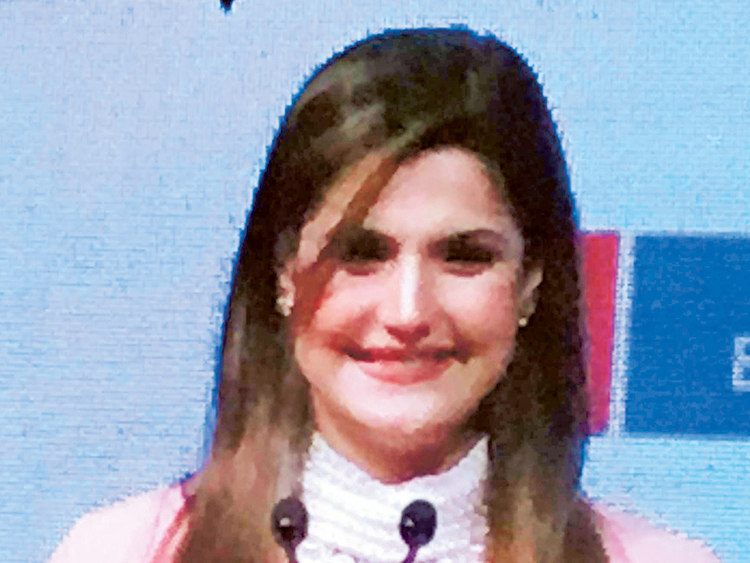
Dubai: A six-month pilot project undertaken in two schools by the Dubai Executive Council (DEC) to reduce childhood obesity has resulted in a reduction of the condition by nearly 7 per cent, Dubai Health Authority (DHA) officials told Gulf News at the one-day Global Crisis of Obesity summit, hosted by the Economists Events, that began on Wednesday.
The project will be implemented across all schools in the next academic year.
Delivering a keynote speech at the summit, Princess Haya Bint Al Hussain, wife of His Highness Shaikh Mohammad Bin Rashid Al Maktoum, Vice-President and Prime Minister of the UAE and Ruler of Dubai, said, ““The global crisis of obesity and associated lifestyle diseases is not just a medical issue. It is a deeply personal human issue requiring a deeply personal human response as people are not just statistics.”
Princess Haya, who is chairperson of Dubai Health Care City, observed that the issue was painfully relevant for Dubai where 75 per cent of adults are overweight and obese and 10 per cent of the world’s diabetics are from the Gulf region. “Good health is our right but it is also a privilege. Treat it well, wisely and proactively and it’s important we teach our youth to make wise and not easy choices,” she said.
Dr Manal Al Taryam, CEO of DHA’s Primary Health Care Centre, highlighted the role of the pilot project. “This recently concluded pilot project was initiated by the DEC and our team called the Blue team. It had four arms — Dubai Municipality, Knowledge and Human Development Authority (KHDA), Dubai Sports Council health care team, primary health centres and DHA’s nutrition department. We worked closely with schools, nurses, parents and children and were given a target to reduce obesity by 1 per cent in six months. But our results were exemplary as we were able to reduce [obesity] by 7 per cent.”
Dr Wafa Ayesh, director of nutrition at DHA, said: “We began with the [help] of nurses in the two participating schools who identified overweight and obese students. We worked with about 265 children in the 5-16 age group. We first held educative, interactive sessions with the nurses, teachers and parents and then structured physical exercise programmes as well as advised parents and schools on the nutritional content of the food these children ate. We are satisfied that this educational and interactive health awareness project yielded a promising result.”
On a related note, Dr Al Taryam said that there is a move to show the calorie content of a product along with its price in restaurants. “We want the client to use emotional intelligence and make the right choice.”
Dr Ayesh added that the school nutrition and health project would not only be adopted across all schools in Dubai but the federal government had plans to adopt it across Ministry of Education schools throughout the UAE.
The summit had distinguished obesity experts from the US and Europe and other international panellists discussing concrete steps to combat the obesity pandemic. While there was a consensus on treating obesity as a disease that needed serious medical intervention, it was observed that lifestyle changes inculcated from childhood, along with proper education and awareness, could cause a paradigm shift in the way communities looked at obesity.
Dr Ramadan Al Beloushi, CEO of Dubai Health Care Authority’s Regulatory Arm (DHCR), commented that it was important for the government to make significant policy changes and ask corporates to include health and physical activity as an integral part of their business philosophy.
Speaking to Gulf News, he said: “There is a concerted effort by the Ministry of Health and other arms of the government to ask business groups to necessarily adopt health initiatives as part of their corporate activity. In fact, we are studying the results of one company that has given pedometers to its employees and encourages them to clock in 10,000 steps each day with a reward incentive at the end of the month and the linking of physical performance to promotions. This organisation has achieved good results in reduction of obesity among its employees. We are in initial policy discussions and perhaps something like this may be worked out to encourage employees to maintain a healthy and active profile.”
In her keynote speech at the summit, Princess Haya Bint Al Hussain emphasised that it was time for the world to destigmatise obesity like it was done with mental health.
She added that apart from public policy and strategy such as Dubai has undertaken with the building of cycle tracks and including physical sports in schools, it was the responsibility of the food and drink industry to curb the availability of fast foods and not just leave it to legislation. Parents need to do more to ingrain healthy food habits in children.
“Obesity is not just a medical issue, it is a social, personal and emotional issue and public policy is not enough to tackle it,” she observed
She impressed upon the specialists gathered at the summit that the crisis required a very fast and radical action and “it starts with you”.
Zarine Khan
“Obesity is not just a disease of the body but of the mind”
Popular Bollywood actress Zarine Khan was one of the speakers at the summit who spoke of her own journey of transformation — from weighing over 100kg as a teenager to becoming a physically fit star.
“I loved junk food and was not aware of how I looked until a family crisis brought on the responsibility of taking care of my family. I had to drop out after high school and the only job I could think of was being an air hostess. I worked hard to lose weight. I began with cutting out junk food, replaced it with simple home meals, got physically active and, in a couple of months, I dropped 50kg in weight. What I started doing for a job became my lifestyle and now I am addicted to fitness. Fitness is not a destination, it is a way of life,” said Khan.
Some facts and figure of global obesity
0.5 billion of population worldwide is obese
40 million children worldwide are obese
44 per cent of the global population, which is 450 million, suffers from diabetes
Nearly 50 per cent of diabetics are still undiagnosed
One person dies every six seconds globally due to diabetes-related complications
180 limb amputations occur daily around the globe due to diabetes-related complications
23 per cent of global population suffers from ischemic heart disease













